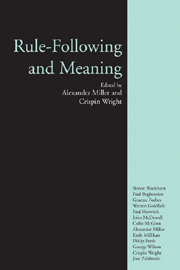Book contents
- Frontmatter
- Contents
- Acknowledgements
- The Contributors
- 1 Introduction
- 2 Skepticism and Semantic Knowledge
- 3 The Individual Strikes Back
- 4 Wittgenstein on Following a Rule
- 5 Wittgenstein, Kripke and Non-Reductionism about Meaning
- 6 Kripke on Wittgenstein on Rules
- 7 Critical Notice of Colin McGinn's Wittgenstein on Meaning
- 8 Meaning and Intention as Judgement Dependent
- 9 The Rule-Following Considerations
- 10 The Reality of Rule-Following
- 11 Truth Rules, Hoverflies, and the Kripke–Wittgenstein Paradox
- 12 Kripke on Wittgenstein on Normativity
- 13 Meaning, Use and Truth
- 14 Kripke's Normativity Argument
- Guide to Further Reading
- Index
12 - Kripke on Wittgenstein on Normativity
- Frontmatter
- Contents
- Acknowledgements
- The Contributors
- 1 Introduction
- 2 Skepticism and Semantic Knowledge
- 3 The Individual Strikes Back
- 4 Wittgenstein on Following a Rule
- 5 Wittgenstein, Kripke and Non-Reductionism about Meaning
- 6 Kripke on Wittgenstein on Rules
- 7 Critical Notice of Colin McGinn's Wittgenstein on Meaning
- 8 Meaning and Intention as Judgement Dependent
- 9 The Rule-Following Considerations
- 10 The Reality of Rule-Following
- 11 Truth Rules, Hoverflies, and the Kripke–Wittgenstein Paradox
- 12 Kripke on Wittgenstein on Normativity
- 13 Meaning, Use and Truth
- 14 Kripke's Normativity Argument
- Guide to Further Reading
- Index
Summary
In Saul Kripke's Wittgenstein on Rules and Private Language, there are two main characters: a semantical skeptic and Ludwig Wittgenstein. Kripke himself, we can suppose, is the narrator. In the course of his narrative, the narrator often speaks for one or the other of the characters, and, when the characters are in agreement, he sometimes speaks for both. However, unlike Dr. Watson and Holmes, Kripke's Wittgenstein does not assent to all the skeptic's chief conclusions. Rather, Kripke's characters are related more in the manner of the governess and Mrs. Gross in The Turn of the Screw. The skeptic sees ‘the super-natural’ where Kripke's Wittgenstein sees only the skeptic's own delusion. Many commentators on Kripke's text have not done a good job of negotiating the question, “Whose voice is speaking in this passage? And now, who speaks in that one?” The upshot has been serious misunderstandings of the structure and content of the implicit dialogue that Kripke depicts in his book. Of course, the misunderstandings do not arise solely out of a deficient sense of ‘point of view’; other factors encourage and support the confusions. These factors also need to be diagnosed. In any case, I will argue that the commentators have often been wrong about what the skeptic assumes, wrong about what Kripke's Wittgenstein concludes, and wrong, correlatively, to read some of the central arguments in a topsy-turvy fashion. My aim is to set these matters straight, commenting, where it seems especially illuminating to do so, upon the mistakes of several of Kripke's major critics.
- Type
- Chapter
- Information
- Rule-Following and Meaning , pp. 234 - 259Publisher: Acumen PublishingPrint publication year: 2002
- 4
- Cited by



